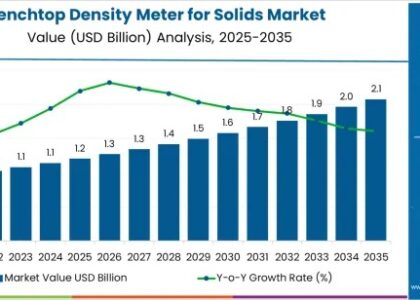
The automotive microcontroller (MCU) market is experiencing a transformative surge in growth, driven by the rapid evolution of modern vehicles. Microcontrollers, the brains behind a multitude of automotive functions, are essential for controlling various vehicle systems, including powertrain, safety, infotainment, and advanced driver assistance systems (ADAS). As the automotive industry shifts toward electrification, automation, and connectivity, the demand for high-performance microcontrollers has never been higher.
This PR content explores the latest trends driving the automotive microcontroller market, highlights the key applications of microcontrollers in vehicles, and discusses the market’s future potential as the automotive industry continues to embrace technological advancements.
Detailed Market Study: Full Report and Analysis
Market Trends Propelling Automotive Microcontroller Demand
- Electrification and Electric Vehicles (EVs) The electrification of the automotive industry is one of the key drivers of the automotive microcontroller market. As automakers increasingly focus on reducing carbon emissions and meeting stringent environmental regulations, the adoption of electric vehicles (EVs) and hybrid electric vehicles (HEVs) is on the rise. Microcontrollers play a crucial role in managing various aspects of EVs, from battery management systems (BMS) to motor control and powertrain functions.In electric vehicles, microcontrollers are used to monitor and regulate battery voltage, temperature, and state of charge (SoC), ensuring optimal performance and efficiency. They also help control electric motors, enabling smooth acceleration, braking, and energy regeneration. As the EV market continues to grow, the demand for advanced microcontrollers with high processing power and energy efficiency is expected to soar.
- Rise of Autonomous Vehicles Autonomous vehicles (AVs) represent the future of mobility, and microcontrollers are at the heart of the systems that enable autonomous driving. From controlling sensors and cameras to processing data from lidar, radar, and GPS, microcontrollers are essential in enabling real-time decision-making in autonomous vehicles.Advanced driver assistance systems (ADAS), such as lane-keeping assistance, adaptive cruise control, and automatic emergency braking, rely on microcontrollers to process data from multiple sensors and execute commands in real-time. As the automotive industry moves closer to fully autonomous driving, the need for powerful microcontrollers capable of handling complex algorithms and high-speed data processing will continue to grow.
- Connectivity and In-Vehicle Networking The trend toward connected cars, where vehicles are equipped with communication systems that allow them to interact with other vehicles, infrastructure, and the cloud, is another major factor driving the demand for automotive microcontrollers. These microcontrollers facilitate communication between various electronic control units (ECUs) within the vehicle, as well as with external networks, enabling features such as vehicle-to-vehicle (V2V) and vehicle-to-infrastructure (V2I) communication.In connected vehicles, microcontrollers are used in infotainment systems, telematics, and over-the-air (OTA) updates, allowing for real-time navigation, entertainment, and software updates without the need for physical intervention. As cars become more connected, the demand for microcontrollers with advanced networking capabilities and security features will increase.
- Advanced Safety Features and ADAS Safety has always been a top priority in the automotive industry, and microcontrollers play a critical role in the development of advanced safety features. Airbags, anti-lock braking systems (ABS), electronic stability control (ESC), and tire pressure monitoring systems (TPMS) all rely on microcontrollers to monitor vehicle conditions and execute safety protocols in the event of an emergency.With the increasing adoption of ADAS, microcontrollers are being used to process data from cameras, radar, and ultrasonic sensors to provide real-time feedback to the driver. This feedback helps prevent collisions, assist in parking, and ensure safe lane changes. As safety regulations become more stringent and consumer demand for advanced safety features grows, microcontrollers will continue to be integral to the development of safer vehicles.
Key Applications of Automotive Microcontrollers
- Powertrain Control One of the most critical applications of microcontrollers in vehicles is powertrain control. The powertrain, which includes the engine, transmission, and drivetrain, is responsible for delivering power to the wheels. Microcontrollers are used to optimize engine performance, control fuel injection, and manage transmission shifts, ensuring efficient power delivery and fuel economy.In electric and hybrid vehicles, microcontrollers manage the interaction between the internal combustion engine (if present), electric motor, and battery. They ensure smooth transitions between different power sources and optimize energy consumption to maximize the vehicle’s range and efficiency.
- Infotainment and Telematics Modern vehicles are equipped with sophisticated infotainment systems that provide drivers and passengers with entertainment, navigation, and connectivity features. Microcontrollers are used to process audio, video, and data signals, enabling seamless integration between the vehicle’s infotainment system and external devices such as smartphones, tablets, and GPS systems.In addition to infotainment, microcontrollers are essential for telematics systems, which allow for real-time vehicle tracking, remote diagnostics, and fleet management. These systems rely on microcontrollers to transmit data between the vehicle and cloud-based platforms, providing valuable insights into vehicle performance and maintenance needs.
- ADAS and Autonomous Driving As mentioned earlier, microcontrollers are fundamental to the operation of ADAS and autonomous driving systems. In ADAS, microcontrollers process data from cameras, lidar, radar, and ultrasonic sensors to provide real-time information to the driver and execute automatic control functions, such as braking, steering, and acceleration.In autonomous vehicles, microcontrollers play an even more critical role by processing massive amounts of data in real-time and making complex decisions based on sensor inputs. For example, microcontrollers are used to interpret visual data from cameras, detect obstacles, and determine the vehicle’s path while ensuring passenger safety.
- Body Electronics and Comfort Systems Microcontrollers are also used in various body electronics systems that enhance comfort, convenience, and vehicle performance. These systems include climate control, lighting, seat adjustment, window regulators, and keyless entry systems. Microcontrollers enable precise control over these systems, ensuring that they operate smoothly and efficiently.In addition, microcontrollers are used in energy management systems that regulate the distribution of electrical power within the vehicle, ensuring that essential systems such as lighting and climate control are powered efficiently without draining the vehicle’s battery.
- Battery Management Systems (BMS) In electric and hybrid vehicles, the battery management system (BMS) is one of the most important components, and microcontrollers play a critical role in its operation. The BMS monitors the health, temperature, and charge levels of the vehicle’s battery, ensuring that it operates within safe limits. Microcontrollers are used to process data from various sensors and adjust battery usage to maximize efficiency and longevity.With the increasing demand for electric vehicles, the need for advanced BMS systems that rely on microcontrollers is growing. These systems ensure that the battery operates safely and efficiently, extending the vehicle’s range and preventing battery-related failures.
Leading Key Players:
- Texas Instruments Incorporated
- NXP Semiconductors NV
- STMicroelectronics NV
- Microchip Technology Inc.
- Renesas Electronics Corporation
- Silicon Labs Private Limited
- Fujitsu Limited
- Maxim Integrated Products, Inc.
- Infineon Technologies
- Toshiba Corporation
Recent Developments:
- In August 2023, ARTERY Technology entered the automotive MCU market with the debut of its first automotive-grade microcontroller, the AT32A403A. This new series of automotive control chips completed qualification tests such as the accelerated environmental stress test and the accelerated lifespan simulation test in accordance with the AEC specification. Moreover, the package assembly integrity test and the electrical verification test were also certified in accordance with the automotive standard AEC-Q100 Grade 2.
- In June 2023, Cortus’s Safe, a fabless semiconductor manufacturing company based in France, introduced low-power RISC-V automotive microcontrollers (MCUs) and announced today by forward-thinking. Cortus ULYSS series satisfies all technological requirements for the various classes of automotive electronic systems by utilizing process technologies. The process technology ranges from 130nm to 12nm, single to eight-core designs, all with floating points and CAN, and clock rates from 240MHz to 1.5GHz. The safety certifications and standards it adheres to include ISO 26262 ASIL-B, ASIL-D, IEC 61508/62061, AEC-Q100/1, AUTOSAR, ISO/SAE 21434, and others.
Future Outlook for the Automotive Microcontroller Market
The automotive microcontroller market is poised for significant growth as the automotive industry continues to innovate and evolve. The rise of electric vehicles, autonomous driving, and connected cars will drive the demand for more powerful and energy-efficient microcontrollers capable of handling complex tasks in real-time.
As automakers invest in research and development to meet the growing demand for smart, safe, and efficient vehicles, microcontrollers will remain a key enabler of these technologies. In addition, the increasing focus on sustainability and reducing carbon emissions will drive further adoption of electric vehicles, creating new opportunities for microcontroller manufacturers.
However, the market also faces challenges, such as the ongoing semiconductor shortage, which has impacted the production of microcontrollers and delayed vehicle manufacturing. Addressing these supply chain issues will be crucial to ensuring the continued growth of the automotive microcontroller market.
Automotive Microcontroller Market Segmentation:
By Material Type:
- Tinned Steel
- Nickel-Cobalt Ferrous Alloy
- Copper Alloy
By Vehicle Type:
- Compact Passenger Cars
- Mid-sized Passenger Cars
- Premium Passenger Cars
- Luxury Passenger Cars
- Light Commercial Vehicles
- Heavy Commercial Vehicles
- Electric vehicle
By Application:
- Advanced Driver Assistance System
- Parking Assist System
- Brake control system
- Electric Control Suspension
- Airbags
- Functional Safety Technology
- Transmission Control
- Start-Stop System
- Electronic Power Steering System
- Other Applications
By Region:
- North America
- Latin America
- Europe
- East Asia
- South Asia and Pacific
- Middle East and Africa (MEA)
About Future Market Insights (FMI)
Future Market Insights, Inc. (ESOMAR certified, recipient of the Stevie Award, and a member of the Greater New York Chamber of Commerce) offers profound insights into the driving factors that are boosting demand in the market. FMI stands as the leading global provider of market intelligence, advisory services, consulting, and events for the Packaging, Food and Beverage, Consumer Technology, Healthcare, Industrial, and Chemicals markets. With a vast team of over 400 analysts worldwide, FMI provides global, regional, and local expertise on diverse domains and industry trends across more than 110 countries.
Contact Us:
Future Market Insights Inc.
Christiana Corporate, 200 Continental Drive,
Suite 401, Newark, Delaware – 19713, USA
T: +1-845-579-5705
For Sales Enquiries: sales@futuremarketinsights.com
Website: https://www.futuremarketinsights.com
LinkedIn| Twitter| Blogs | YouTube





